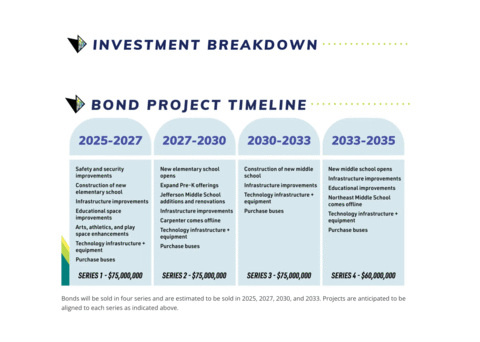Michigan schools seek $1.6 billion in new public debt May 6
Residents of 31 school districts will vote on school bonds
Voters in 31 school districts across Michigan will decide May 6 whether to take on new debt for various repairs, remodeling projects, upgrades and other modifications to school property. If voters approve every request, they will need to pay off $1.6 billion over time, with that money coming out of property taxes.
School districts that finance borrowing through bonds use the money for large-scale projects such as remodeling buildings or constructing new ones. Nearly all the districts seeking voter approval for new debt — 26 of the 31 — say they want to spend more on equipment for instructional technology. That’s according to a list compiled by the Michigan Department of Treasury. Security is another popular spending area, with 21 of the 31 districts mentioning it in their public notices. Central Lake Public Schools in Antrim County says it will construct secure entrances as part of its $15.4 million request.
Public school districts rely on money from the state — known as the foundation allowance — for their day-to-day expenses. So, too, do charter schools, which are public schools that operate independently from school districts. But districts have an advantage over charter schools: They can borrow money for expensive projects and then pay off the debt by taxing the local population. Charter schools may borrow, but they can’t levy taxes.
“Since charter schools do not have a tax base, they are unable to levy dollars for capital infrastructure,” according to the Michigan League of Public Policy. “Therefore, they have to rely on their foundation allowance revenue to pay for facility costs.”
Many of the districts seeking voter approval May 6 want to spend more on sports and recreation, with 24 indicating plans to construct or improve athletic fields and 16 mentioning playgrounds. Gwinn Area Community Schools (total ask: $30.9 million) wants to construct a press box and undertake other projects, and Alma Public Schools (total ask: $29.9 million) says it would improve or develop various athletic features, including a press box.
Transportation is on the minds of a few districts: seven mentioned parking lots and driveways, and seven said they would buy more buses.
The median request on the May 6 ballot is for $30.9 million in new debt, but three districts want voters to pay for more than $100 million in new spending: Midland Public Schools ($285 million), Dexter Community Schools ($249.9 million) and Ferndale Public Schools ($114.8 million).
Several districts want to add between $75 million and $100 million in debt. These include St. Johns Public Schools ($99.8 million), Mount Clemens Community School District ($91.8 million), Allendale Public Schools ($88.1 million), Reed City Area Public Schools ($88.1 million) and Lamphere Public Schools ($85 million).
The Midland district wants to construct a new elementary school and a new middle school, among other things. If voters approve the millage, the district would sell bonds in four series. About 54% of the spending would go to new construction, according to the district.
 Millage spending timeline | Midland Public Schools
Millage spending timeline | Midland Public Schools
Officials in Dexter want to create a new theater for middle school students, purchase a new weight room, replace the turf of an athletic field, and undertake other projects. The Ferndale district’s plan calls for demolition and an addition, aimed at separating middle school students from high school students.
The 31 school districts that will place a tax measure on the ballot have a total enrollment of 54,572, according to MI School Data, a state repository of information.
Roughly 10% of the state’s students were enrolled in public charter schools in the 2022-23 fiscal year, according to the Michigan Senate Fiscal Agency. Approximately 285 charter schools serve 150,000 students, most of whom face socioeconomic disadvantages, according to the Michigan Association of Public School Academies, which represents charter schools in public debates.
Michigan Capitol Confidential is the news source produced by the Mackinac Center for Public Policy. Michigan Capitol Confidential reports with a free-market news perspective.


 Taxpayers rejecting pricier school bonds
Taxpayers rejecting pricier school bonds
 Voters to decide fate of $1.6B in new school debt
Voters to decide fate of $1.6B in new school debt
 Plainwell Community Schools seeks $40M bond for new building six months after last rejection
Plainwell Community Schools seeks $40M bond for new building six months after last rejection